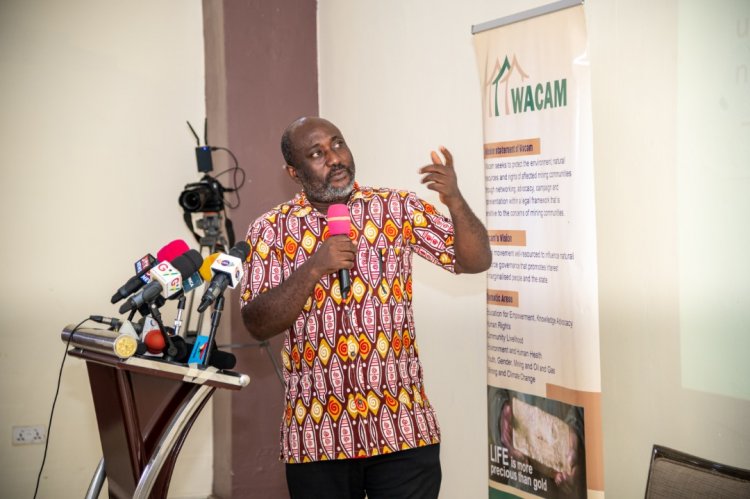Wacam, a community-based human rights and environmental mining advocacy non-governmental organisation (NGO), has launched a ‘Report on the ‘Apiatse Explosion,’ which incident ravaged the Apiatse community.
.
The launch of the report, which came off at the Tomreik Hotel in Accra on Friday, January 20, 2023, also marked the one year anniversary of that unfortunate incident which resulted in the death of fourteen (14) people and displaced 2,000 people in Apiatse.
The study which culminated into the report spanned over a four-month period and was undertaken by a team of five.
They are a lecturer at the University of Cape Coast (UCC), Dr Emmanuel Tenkorang (the team lead), the Executive Director of Wacam, Mr. Daniel Owusu-Koranteng, the Associate Executive Director of Wacam, Mrs Hannah Owusu-Koranteng, the Executive Director of Centre for Public Interest Law (CEPIL), Lawyer Augustine Niber, and the Executive Director of Centre for Environmental Impact Analysis (CEPIL), Dr Samuel Obiri.
The study set out to investigate what led to the Apiatse accident and interventions made by the relevant government institutions.
It also examined the relevant legislative provisions on explosive transport for mining operations and how they were complied with and made recommendations based on its findings.
Launching the report, the Executive Director of Wacam, Mr Daniel Owusu-Koranteng, expressed his outfit’s unhappiness about the government’s ‘lack of transparency’ in making its report of the Apiatse Fact-Finding Committee public.
He reminded the government that issues of public safety were important for public discourse.
“We are marking the one-year pain of the people Apiatse some of whom continue to live in tents and on the charity of benevolent people without knowing when they would be restored to their previous life of dignity and social cohesion,” he bemoaned.
According to him, the Apiatse incident should be used to look at the weaknesses in the mining regulations and impress upon the government to address the negative effects of mining companies and those that provide ancillary services.
“We should ensure that the Apiatse Explosion is not treated as one of the serious occurrences relating to public safety in our country that are met with heightened enthusiasm but easily die off with time,” he advised.
While expressing solidarity with the affected people, Mr Owusu-Koranteng said Wacam was also calling for transparency for the causes and effects of the incident on the people of Apiatse.
This, he noted, would ensure that duty bearers and the company are held accountable.
“A critical assessment of the negative effects of the explosion on the people of Apiatse reveals different dimensions of the impact on the people including but not limited to the Loss of Livelihood of Community People, Destruction of Personal Properties, Physical and Economic Displacement, Health Impacts, Fatalities (Deaths), Impact on Education, Social Disorientation and De-agrarianisation which is defined as the process of economic activity reorientation, occupational adjustment and spatial re-alignment of human settlement away from agrarian patterns,” he said.
In this regard, Mr Owusu-Koranteng stressed the need for the country to draw lessons from the Apiatse incident.
However, he wondered whether the country would learn from painful experiences like the Apiatse explosion.
In a presentation on the report, the leader of the research team, Dr. Emmanuel Tenkorang, outlined the recommendations of their report.
According to him, companies working in the mining sector and ancillary companies must follow all regulations and legal requirement in undertaking any operations.
“The requirement of the presence of a competent person is necessary, for instance, in the case of Apiatse this person could have put the initial fire under control possibly preventing the second explosion,” he added.
The report also called on the state to set up, especially in areas of high extractive and industrial activities, an emergency coordinating unit with the District Assembly put in charge of emergency response.
This unit, Dr Tenkorang explained, should be trained and given resources to be able to respond appropriately to emergencies in their jurisdictions.
“The state should create awareness on the dangers of explosives and how citizens should conduct themselves in similar situations.”
“The LI 2177 should be reviewed to include a provision for strict liability for a company that failed to adhere to the provisions of the regulations resulting in an explosion that causes injury to people such as the present case (Apiatse).”
“The LI 2177 should also include procedures upon which persons injured as a result of the explosion can claim compensation.”
The report also recommended that persons injured as a result of the explosion take action(s) in court to claim damages for the negligence of the company for the injuries they sustained as a result of the explosion.


 Freeman Koryekpor
Freeman Koryekpor 



































